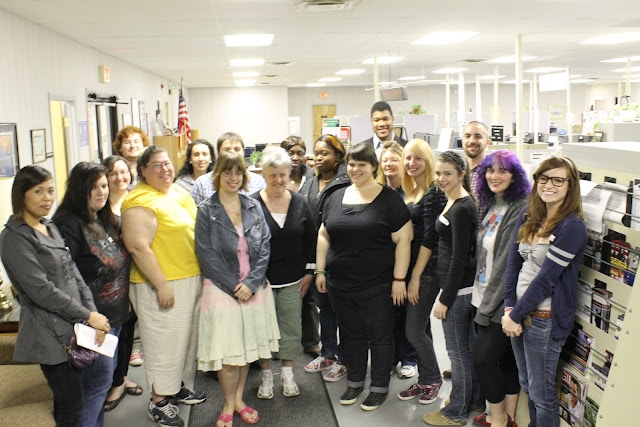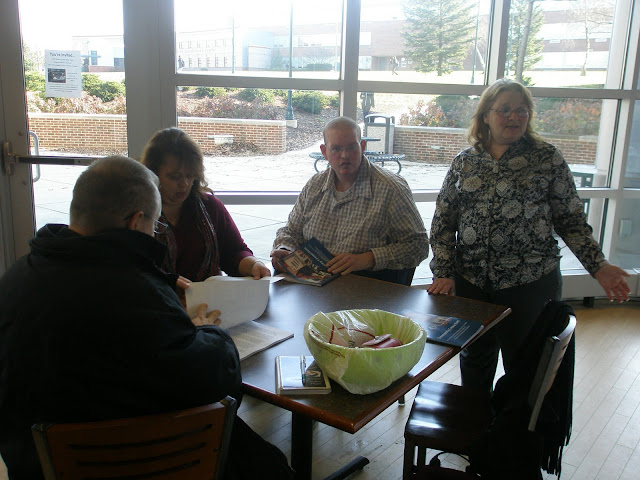Much like Marie, I haven't been able to write this final blog post, even though I've thought about what it should say every day since my final session with my student. In fact, I haven't been able to pack very much for my Arizona move or check items off of my to-do list because I keep thinking I have so much time before I leave, that I'll see everyone as frequently as I see them now.
This week, at my part-time job at a gym, one of my favorite gym members said as he was leaving, "Alright, I'm traveling for work, so I'll see you in a month." My eyes grew wide and I shouted, "I won't be here in a month!" before he could exit the gym. We're not really close, just conversational while I'm working since I'm rarely too busy, so we looked at each other in an awkward nice-to-have-known-you kind of way, and he said he hoped to read something I publish someday. And that was it. A goodbye. The first goodbye that felt real, even though it was with somebody I barely knew.
And so now I can write. Now that it has hit me-- this is my last month living in Pennsylvania for years-- I'm finally ready to write this post.
My college experience hasn't been the easy one most of my friends have had. I fell in love with my first school, the University of Pittsburgh, right away. I worked in the English Department, explored the city, ate at delicious restaurants, met David Sedaris, visited the Carnegie library almost every week, and most of all, discovered who I am outside of my family life. And in my sophomore year, I learned about money. Especially how the lack of it can permeate all of life if you allow it. I knew I couldn’t put my family and myself through any more financial stress by attending Pittsburgh, so by Saturday morning, I had finished and submitted an application to Shippensburg University. By December, I was moving from my small dorm room into my house, and by January I was a Ship student.
I envied my friends who got to stay at their choice schools, ignored or privately sneered at stories of their new cities and towns, new friends, parties, everything. I didn’t like being that person, but I couldn’t divorce my circumstances from theirs, and I couldn’t be happy for them when I felt so miserable. I was a good student in high school and at Pitt, and was always a good kid who never found herself in any trouble, so I couldn’t understand why I didn’t have what I wanted even when I seemed to be doing everything right. My best friend’s Dad could sense my discontent, and told me, “It’s not so much about location, or prestige…it only takes one professor to make your college education.”
Years later, as an older and (maybe a little?) wiser college graduate, I’m thankful that I transferred schools-- what seemed at the time an excruciating blow to my future turned out to be more than fine. And my friend’s dad was right (see that, Thom? I admitted it)—it took the guidance of a few professors to do it. One of those professors, out of several that have been so, so helpful, was Dr. Cella, who introduced me to the literacy council. It was a combination of time and my volunteer work that brought me out of my petty angst and allowed me to see what is truly useful about a college degree. It’s not a big-name school that makes a worthwhile education—it’s what you do with what you have.
I thought leaving Pitt meant not living up to my potential, but I didn’t really know what my potential was, or the many ways that potential can manifest itself. I thought big city, big opportunities, and while that’s certainly true, I never would have realized the issues in my home community if I stayed in the city. My work at the literacy council reminded me that it is not just cities or well-known universities that have the ability to tackle social problems—it can be done anywhere with the time, patience, and shared motivation of people. I’m grateful my service came in my senior year, even though it means a goodbye must happen sooner. I wasn’t prepared for selflessness when I left Pittsburgh—I was Miss Woe-Is-Me, and that attitude is not appropriate when working to build a better community.
The literacy council taught me, each week, that life isn’t about rank. So I heard more about Pittsburgh on the Princeton Review website—I became a better person in Shippensburg. Helping individuals, in great towns or small ones, is what I’m supposed to do. Yes, I learned patience, I learned that my degree can be useful in a non-profit, I learned how to explain material a bit better and that a score on a test doesn’t necessarily measure intelligence. But best of all, I learned what gives me purpose.
So for that very great life lesson, I thank Marie, Dr. Cella, my students and their families, Cody, and the Americorps VISTA program. It has been a wonderful year.






















































